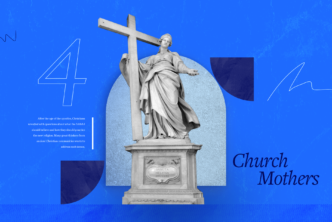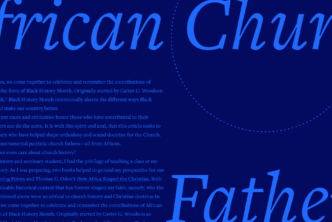Who is Luke and why is he important?
Luke was acquainted with and traveled with the apostle Paul. Not only did Luke travel with Paul outside the land of Israel, he also visited Israel and may have become personally acquainted with members of Jesus’s family, including his mother Mary and his brother James.
Between them, Luke and Paul wrote more than half of the New Testament. This makes Luke hugely important for Christianity.
Table of contents
- Where does the Bible refer to Luke?
- What are the key details of Luke’s background?
- Who wrote the Gospel of Luke? What other books did Luke write?
- What are Luke’s major contributions to Bible?
- How does Luke’s portrayal of Jesus differ from the other Gospels?
- How has the Gospel of Luke influenced Christianity and theology?
- What are some common misconceptions about Luke?
- Why is understanding Luke important for biblical studies?
Where does the Bible refer to Luke?
Luke’s name appears three times in the Bible. All three occur in the New Testament, and all three are found in letters written by Paul (Col 4:14; 2 Tim 4:11; Phil 24).
In Colossians 4:14, Paul refers to Luke as “the beloved physician.” In Philemon 24, Luke is listed along with Mark, Aristarchus, and Demas among the apostle’s “fellow workers.” Both of these references occur in what we know as Paul’s Prison Letters, for they were written while the apostle was detained either in Caesarea Maritima, on Israel’s coast, or in Rome.
The third reference to Luke is found in 2 Timothy 4:11, where Paul says, “Luke alone is with me.” The letters 1 Timothy, 2 Timothy, and Titus are known as the Pastoral Letters. They were written during Paul’s second and final imprisonment.
All three of the references to Luke happen in letters that Paul wrote while in prison.
Interestingly, all three of the references to Luke happen in letters that Paul wrote while in prison. This suggests that Luke was a loyal friend who fully shared Paul’s convictions. Luke was not among those who abandoned the apostle.
What are the key details of Luke’s background?
Paul identifies Luke as a “physician” (lit. “healer”).
In classical antiquity, public opinion of physicians was mixed. For example, the Jewish sage Yeshua ben Sira (2nd cent. BC) praises physicians (Sir 38:1–3). But in another place he says, “He who sins before his Maker, may he fall into the care of a physician!” (38:15 ESV). This is not a word of assurance!
Greeks and Romans were especially hard on physicians. Pliny the Elder (died AD 79) was convinced that Greek physicians “have conspired together to murder all foreigners with their physic,” which, of course, “they do for a fee!”1 Pliny also reminds his readers of a cynical inscription on a tomb, which reads: “It was a crowd of physicians that killed me.”2 Emperor Hadrian (ruled AD 117–138), who suffered from dropsy and found no relief, was remembered to have said: “Many physicians have slain a king!”3
We see Luke’s professional sensitivity on this score in how he edits Mark’s description of the woman suffering from a hemorrhage for twelve years. Mark says that the woman “had suffered much under many physicians, and had spent all that she had, and was no better but rather grew worse” (5:26 RSV), whereas Luke says only that she “had had a flow of blood for twelve years and could not be healed by any one” (8:43 RSV). Interpreters suspect that Luke, sympathizing with his fellow physicians, suppressed Mark’s highly negative assessment of medical failure.
Early Christian writers thought that Luke was probably a gentile. For instance, the “anti-Marcionite” prologue to the Gospel of Luke says, “Luke was a Syrian of Antioch, a doctor by profession, who was a disciple of apostles, and later followed Paul.”4 Eusebius the church historian agrees, identifying Luke as a physician from Antioch (Hist. eccl. 3.4.7). Epiphanius (Panarion 51.11.2; cf. 20.4.3) adds that Luke was one of the seventy-two disciples (cf. Luke 10:1), although most modern interpreters reject this claim.
Modern scholars think that Luke probably attended the Jewish synagogue, where he became familiar with the Jewish faith and Scriptures. Although the literacy rate in the Roman Empire was perhaps not as low as was once thought, sophisticated book literacy was not common. Judging by the writings Luke left behind, the evangelist was a literate, well-educated man.
Luke is described as a “companion of Paul” (Irenaeus, Adv. haer. 3.1.1; see also 3.10.1; 3.14.1). We find additional support for this in Paul’s references to Luke in his letters (Col 4:14; 2 Tim 4:11; Phil 24) as well as the “we sections” in the book of Acts (e.g., 16:10–17; 20:5–15; 21:1–18; 27:1–28:16).
Start a study on Luke the physician in the Factbook inside Logos. Get the Logos app free, if you don’t already have it.
Who wrote the Gospel of Luke? What other books did Luke write?
Church tradition has held that Luke the physician penned both the Gospel of Luke and the second volume known as the Acts of the Apostles. The great fourth-century church historian Eusebius said that Luke, “has left us, in two inspired books … One of these books is the Gospel … The other book is the Acts of the Apostles.”5 We find even earlier expressions of this tradition in late-second-century Irenaeus (Adv. haer. 1.27.2; 3.11.7; 3.12.12) and early third-century Tertullian (Adv. Marc. 4.2.2, 5; 4.5.3). The oldest Greek manuscript of Luke, 𝔓75, which dates to the third century, ends with the words, “Gospel according to Luke.”
Scholars now widely accept that these two volumes were authored by the same person, although many continue to debate when they were written. The prefaces that introduce each (Luke 1:1–4; Acts 1:1–2) are of great importance in helping us detect the authorship and relationship of these two volumes. Both address a man named Theophilus (Luke 1:3; Acts 1:1). Moreover, the preface to the second volume, Acts, makes reference to the first volume, that is, the Gospel of Luke (see Acts 1:1), showing their connection. Scholars also note their similarities to prefaces written by the first-century Josephus in his two-volume work directed against an anti-Semite named Apion (Ag. Ap. 1.1–3; 2.1).
What are Luke’s major contributions to Bible?
Remarkably, Luke’s two volumes (Luke and Acts) constitute approximately one quarter of the New Testament! This makes Luke the most prolific of all New Testament writers.
Perhaps the evangelist’s greatest contribution is his second volume, the Acts of the Apostles. Whereas we have four Gospels that each narrate the life and teachings of Jesus of Nazareth, we have only one account of the first generation of the church. This account spans from the early 30s to the early 60s, roughly.
The Acts of the Apostles is crucial for our understanding of how the church transitioned from a localized Jewish messianic movement to a worldwide movement that included non-Jews in its membership. Acts narrates the expansion of the church from Jerusalem, where Jesus was crucified and resurrected, to Rome, the capital of the Mediterranean world. Thus, Luke provides the context for interpreting the rest of the New Testament and its writings to these churches.
The Acts of the Apostles is crucial for our understanding of how the church transitioned from a localized Jewish messianic movement to a worldwide movement that includes non-Jews in its membership.
As Luke details the spread of the gospel, he is careful to show that Paul’s mission to the gentiles is anchored in the decisions of the church’s Jewish leadership, as seen in the two councils in Acts 11 and 15. In the first council, they decide that non-Jews may indeed become members of the church, and in the second council they decide that non-Jews who join the church need not become Jewish proselytes in order to do so. These decisions constitute a vital backdrop to Paul’s mission and the ecclesiology and soteriology to which he gives expression in his several letters.
How does Luke’s portrayal of Jesus differ from the other Gospels?
The Gospel of Luke is similar to the Gospel of Matthew in that both make use of an early form of the Gospel of Mark and a body of Jesus’s teaching that scholars call “Q.” But Luke differs from Matthew. Unlike Matthew, Luke does not include a series of discourses, nor does he emphasize ways Jesus has fulfilled the Law or the ways Jesus’s interpretations of the Law surpasses the questionable interpretations espoused by rival Jewish teachers.
Luke’s greatest difference, though, consists in how he presents Jesus and his ministry as relevant for all people, including gentiles. (We see this especially in the book of Acts.) To this end, Luke features several parables not found in the other Gospels. All of these parables challenge faulty assumptions regarding election and salvation. They complement Paul’s teaching that justification comes through repentance and faith, not works of the Law. These unique parables include, among others:
1. The parable of the good Samaritan (Luke 10:30–35)
This parable teaches that the one who fulfills the command to love one’s neighbor can belong to a despised ethnic group.
2. The parable of the great banquet (14:15–24)
This parable teaches that the poor and sick, that is, the apparent-judged, may find themselves enjoying the eschatological feast (cf. Isa 25:6), not the the healthy and affluent, that is, the apparent-blessed.
3. The parable of the two sons (15:11–32)
This parable teaches that even the most undeserving can repent—and when they do, their righteous brothers should receive them with joy.
4. The parable of the rich man and Lazarus (16:19–31)
This parable reiterates the point that wealth is no sign of election and poverty and ill-health are not signs of non-election.
5. The parable of the Pharisee and the tax collector (18:9–14)
This parable teaches that heaven hears repentance, not boasting.

Use Logos’s Advanced Timeline tool to explore significant dates in Luke’s life.
How has the Gospel of Luke influenced Christianity and theology?
The Gospel of Luke and the Acts of the Apostles have had an enormous impact on Christian theology and practice. Both of these writings motivated the gentile mission. Whereas the Gospel of Matthew primarily addressed the synagogue and the Jewish membership of the church, and the Gospel of Mark challenged the Roman Empire and its misguided faith in Caesar as the “son of God” and occasion of the “good news” for the world, the Gospel of Luke and the Acts of the Apostles underscored the openness of the church to the gentile, outsider, and outcast.
The Gospel of Luke and the Acts of the Apostles underscored the openness of the church to the gentile, outsider, and outcast.
Luke’s writings, studied together with the letters of Paul, clarify how the Christian movement grew out of Jewish soil and fulfilled promises to the Jewish patriarchs and the prophecies of Israel’s great prophets.
What are some common misconceptions about Luke?
The most pernicious misconception about Luke and Acts is that these pro-gentile writings are anti-Jewish or even anti-Semitic. Nothing could be further from the truth.
Luke’s infancy narrative (Luke 1–2) recalls and celebrates Israel’s great tradition of election.
- The angel tells Zechariah, father of John the Baptist, “He will turn many of the sons of Israel to the Lord their God” (1:16 RSV), which alludes to Malachi 4:6.
- The angel announces to Mary the conception of her son Jesus: “He will be great … and the Lord God will give to him the throne of his father David, and he will reign over the house of Jacob forever” (Luke 1:32–33 RSV).
- In response, Mary utters a song we call the Magnificat. Her opening words, “My soul magnifies the Lord, and my spirit rejoices in God my Savior” (1:46 RSV), recall the opening words of Hannah’s song of gratitude, “My heart exults in the Lord” (1 Sam 2:1 RSV). Hannah’s song responds to the conception of Samuel, Israel’s great priest and prophet who anointed David as king.
- When John is born, Zechariah praises God, “Blessed be the Lord God of Israel, for he has visited and redeemed his people, and has raised up a horn of salvation of us in the house of his servant David” (Luke 1:68 RSV).
The advent of Jesus the Messiah, which has opened the door of salvation to Gentiles, has not closed the door on Israel.
These passages—and more could be cited—reveal the depth of Luke’s commitment to the election of Israel. The advent of Jesus the Messiah, which has opened the door of salvation to Gentiles, has not closed the door on Israel.
Why is understanding Luke important for biblical studies?
Although written almost two thousand years ago, the theology and precedent of Luke–Acts remains relevant for the church today.
Luke–Acts teaches the church to remember that Israel still has a place in God’s plans (see Rom 11) as well as God’s concern for the poor, the sick, and the marginalized. The Jesus of Luke chastised his religious contemporaries for neglecting the poor. In contrast, the early church, as portrayed in Acts, cared for the poor and made great gains in Jerusalem as a result. Affluent members of the church gave generously to the poor (Acts 2:42–46; 4:32–37). Thousands professed their faith in Jesus (Acts 2:47; see also 4:4; 5:14; 6:7).
As Luke records, the good news of Jesus Messiah is to be proclaimed “in Jerusalem and in all Judea and Samaria and to the end of the earth” (Acts 1:9). All are welcome (28:30–31).
Continue your study of Luke with resources recommended by Craig Evans
- David P. Moessner, Jesus and the Heritage of Israel: Luke’s Narrative Claim upon Israel’s Legacy (Harrisburg: Trinity Press International, 1999).
Luke, Volume 1 & Volume 2 (Baker Exegetical Commentary on the New Testament | BECNT)
Regular price: $134.99
The Gospel according to Luke, 2 vols. (The Anchor Yale Bible Commentary | AYBC)
Regular price: $105.99
The Gospel of Luke (The New International Commentary on the New Testament | NICNT)
Regular price: $49.99
Related articles
- Acts of Persuasion: Why Did Gentiles Convert to Christianity?
- Women in Luke’s Gospel: Christianity’s Elevation & Concern for Women
- Women in Acts: Women’s Role in the Birth of the Church
- What Did Mary Know? Quite a Bit, It Turns Out

- Pliny the Elder, Natural History 29.7, trans. W. H. S. Jones, Loeb Classical Library 418 (Cambridge: Harvard University Press, 1963), 8:193.
- Pliny, Natural History 29.5.
- Dio Cassius, History of Rome 69.22.4, trans. E. Cary, Loeb Classical Library 176 (Cambridge: Harvard University Press, 1925), 8:463.
- “The Anti-Marcionite Prologues to Luke, ” trans. Roger Pearse from D. De Bruyne, “Les plus anciens prologues latins des évangiles,” Revue Bénédictine 40 (1928): 193.
- Eusebius of Caesaria, Church History 3.4.7, in Eusebius: Church History, Life of Constantine the Great, and Oration in Praise of Constantine, ed. Philip Schaff and Henry Wace, trans. Arthur Cushman McGiffert, A Select Library of the Nicene and Post-Nicene Fathers of the Christian Church 1, Second Series (New York: Christian Literature Company, 1890), 136–37. See also 2.22.6; 3.4.1.





